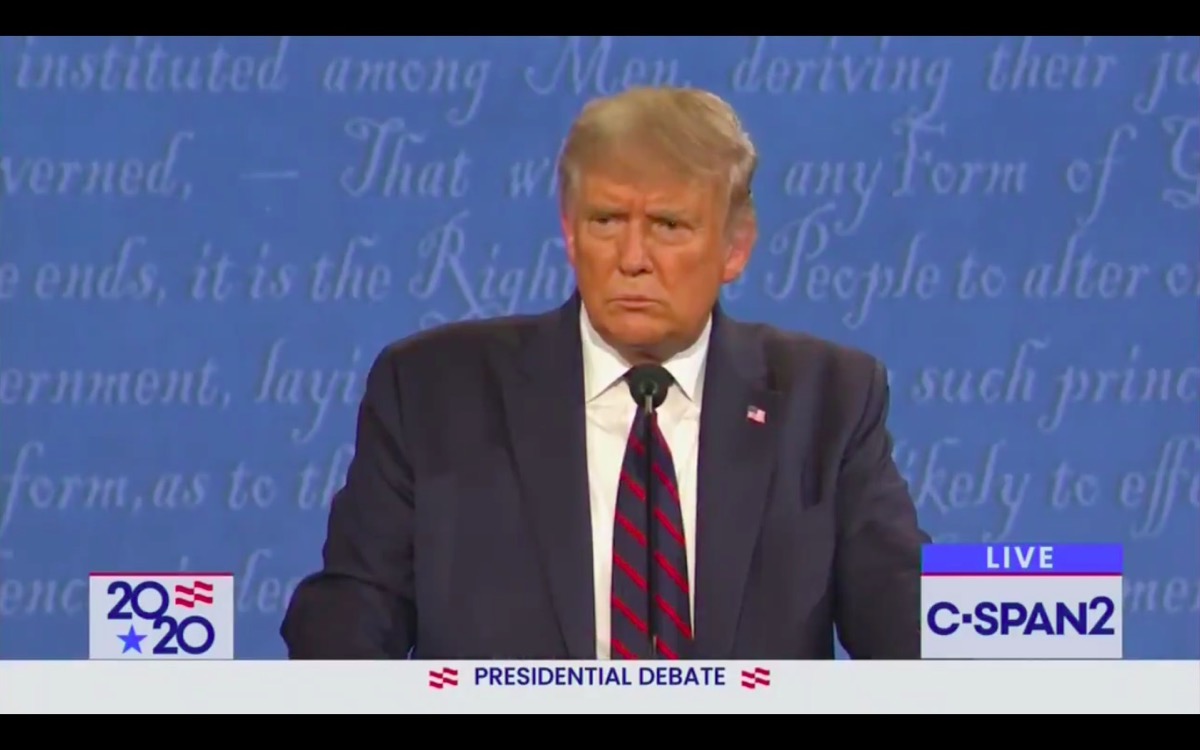Can’t Believe This Has to Be Said: That’s Not a Condemnation of White Supremacist Groups and Violence, Donald Trump

At the first presidential debate of the 2020 election last night, moderator (and Fox News anchor) Chris Wallace asked Donald Trump to do a simple thing: condemn white supremacists and “militia” groups and tell them to stand down instead of instigating violence. Donald Trump did not do that, but of course, he’s already got people jumping to his defense and saying he did, so let’s break down how that’s inaccurate, why he did not, and why this question keeps coming up.
First, let’s talk about what he did say.
When asked if he would denounce those groups, Trump repeatedly said, “Sure,” but as Wallace and Joe Biden repeatedly pointed out … saying “sure” that you will condemn them is not the same as doing so—especially when you follow it with “but I would say … I would say almost everything I see is from the left wing, not from the right wing.” That kind of equivocation is Trump’s go-to tactic when pressed on this subject, stretching all the way back to his “hatred, bigotry, and violence on many sides” comments in the wake of the events in Charlottesville during the first months of his administration.
It’s the “all lives matter” of denouncing white supremacist groups. It’s a failure to be fully invested in the subject at hand, which is disgraceful when that subject is the very real threat of white supremacist violence.
Holy shit. Trump refuses to condemn white supremacist groups. pic.twitter.com/FFSrvA1tcQ
— Aaron Rupar (@atrupar) September 30, 2020
He also asked Wallace to name a specific group that he should denounce to satisfy everyone, like a petulant child offering a begrudging apology, at the behest of adults, for something they’re not really sorry about. Not only that, but when a specific group WAS named—the pro-Trump “Proud Boys”—Trump told them to “stand back and stand by,” which many will no doubt try to excuse as just Trump managing to mangle the wording of “stand down,” but the Proud Boys themselves got the message loud and clear.
And, again, Trump knows and expects that. It’s the inverse of damning with faint praise. He knows that he can offer halfhearted, excessively qualifier-laden admonitions and then pivot to attacking others, and many will afford him the benefit of the doubt that he really meant it while he also maintains the favor of the hate groups that love him by not going after them any more than the absolute bare minimum—or less. It’s win-win for him any time his words are taken more credulously than they deserve to be, which happens constantly.
However, even if Trump had, under the circumstances, managed to repeat the phrase “I condemn white supremacist groups,” that is fundamentally not the same as offering a meaningful condemnation. It would simply be Trump holding up a bible for a photo op all over again. It would be Republican senators speaking out against Trump while rubber stamping nearly everything he does. It would be Michael Scott shouting, “I declare bankruptcy!” and expecting that to change anything on The Office—except that Donald Trump knows it’s not going to change anything, and that’s the way he wants it.
That’s why overly literal fact checks that claim Biden was wrong to say that Trump has never denounced white supremacists (and yes, they already exist) miss the point. To return to that Office analogy, did Michael Scott declare bankruptcy? Well, technically, yes, in a very literal sense, but that’s not what anyone is talking about when they say “declare bankruptcy,” and we all know it, and to pretend otherwise when it comes to denouncing violent, fascist hate groups is to be intentionally, dangerously obtuse.
It’s the same with Donald Trump and white supremacist and racist violence. Yes, he has technically offered words opposing racist violence, but they’ve always been couched in denouncing all violence and “both sides”-ing everything, and let’s not forget that these words have always come under great pressure.
Denouncing something because you’ve been repeatedly, specifically asked to is not the same as genuinely wanting to tear it down. Trump has never been a man of few words, and we’ve all noticed his propensity to go on and on about the evils of anyone who he sees as his opponent, but he suddenly finds himself grasping for words and asking others what they’d like him to say when it comes to denouncing violent racists. He has no interest in substantively attacking these groups, and that’s because they’re on his side.
If you listen closely in the vide above, he notes in his equivocation that the violence is coming “from the left wing, not from the right wing.” He knows these hate groups are on his side of the political spectrum. He might as well have come right out and said it. He can talk about how he would like peace all he wants, but those are empty words when coupled with his history of stoking violence and unrest, as Biden correctly pointed out (despite Trump’s lie that it never happened) Kellyanne Conway has admitted the Trump team sees as good for him. Once again, simply claiming that peace is your goal does not make it so.
So no, while technicalities can be brought up, along with canned statements released by Trump’s White House under great, sustained political pressure to do so, combating white supremacist hate or hate groups is clearly not of particular interest to Donald Trump, and that’s what is being highlighted by continually offering him opportunities to change that impression—occasions he has, to this day, never risen to.
(image: C-Span)
Want more stories like this? Become a subscriber and support the site!
—The Mary Sue has a strict comment policy that forbids, but is not limited to, personal insults toward anyone, hate speech, and trolling.—
Have a tip we should know? [email protected]
